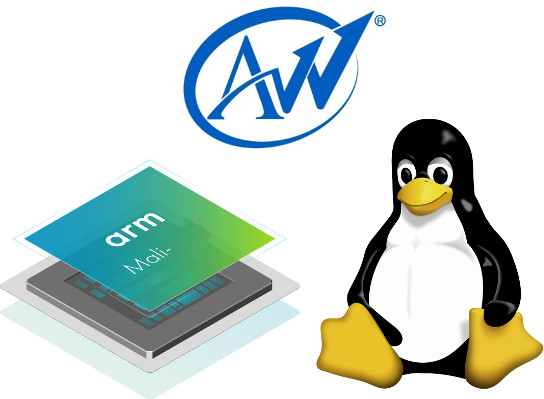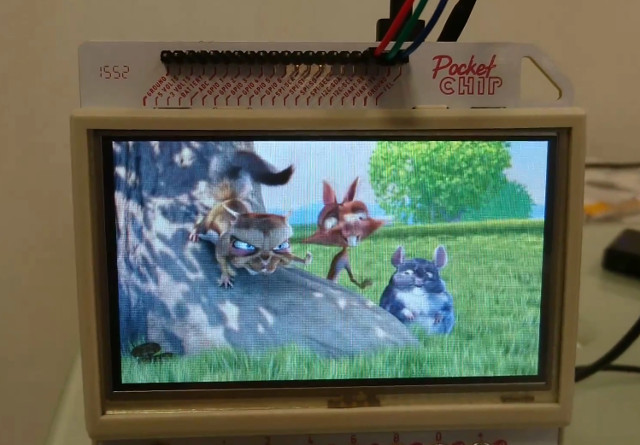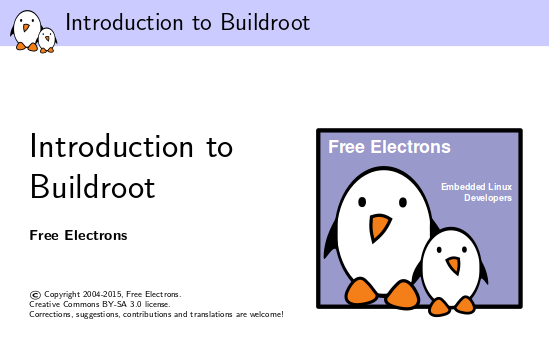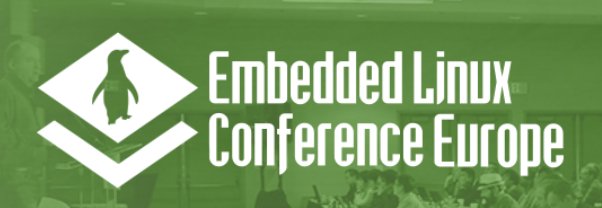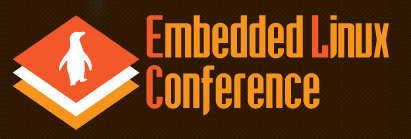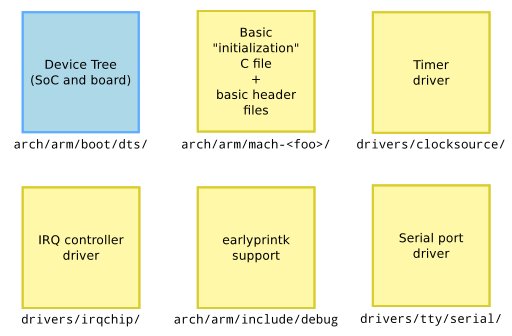OpenGL ES support in Linux for ARM SoC is usually pretty hard to get because of closed source binary blobs coupled with the manufacturers focus on Android. Workarounds include open driver projects such as Freedreno for Qualcomm Adreno GPU, Nouveau for Tegra, or Etnaviv for Vivante GPUs, as well as libhybris library that converts Linux calls into Android calls in order to leverage existing Android GPU binary blobs. Allwinner processors relies on either PoverVR or ARM Mali GPU, and the former does not have any open source project, while some work is still being going for the latter with Lima project, but it’s not ready yet. That means so far, you’re only option was to use libhybris for either GPU family. The good news is that Free Electrons engineers have been working on OpenGL ES support for ARM Mali GPU for Allwinner processor, and have been allowed to release the […]
C.H.I.P Board and Allwinner A13/R8 SoCs To Get VPU Support in Linux Mainline
Allwinner has mixed relationships with open source communities such as Kodi, especially due to issues with its closed-source CedarX VPU drivers, and some GPL violations. However to address the former, linux-sunxi community has been working on open source Cedrus library for the video processor unit on Allwinner processors, that’s been successfully tested on boards such as Orange Pi One. Free Electrons has gone further, as they’ve made sure Cedrus now works with Linux mainline kernel, currently Linux 4.8, and tested it on Allwinner R8 based Pocket CHIP. The work has been done by Florent Revest, a 19 years old intern at the company, who delivered a new sunxi-cedrus driver, a Video4Linux (V4L2) memory-to-memory decoder kernel driver, and corresponding VA-API backend, with the implementations currently available on Github here and there respectively. Currently only MPEG2 and MPEG4 are working, but adding other codecs such as H.264, and video encoding is possible […]
Free Electrons Releases Buildroot Training Materials
Free Electrons develops embedded Linux & Android software, and also provides related training. On-site training sessions are scheduled from time to time, or organized on request, and they usually release their training materials for free, as they did for their Embedded Linux training in 2012, or their Yocto Project / OpenEmbedded course more recently. Thomas Petazzoni, Free Electrons’ Chief Technical Officer, recently informed me that the company also released training materials for Buildroot, which like the Yocto Project is a build system, but it had been around for much longer, and the company is actively participating in its development with over 2,800 patches submitted upstream over the years. Four main resources have been released for the course, under a Creative Commons BY-SA license: training materials for Buildroot – 325 pages Practical labs instructions (PDF) with BeagleBone Black – 32 pages Practical labs data (.tar.xz) – Patchsets for drivers, rootfs, and […]
Embedded Linux Conference Europe 2013 Schedule – Build Systems, Security, Device Tree, Debugging & Profiling Techniques, and More
Embedded Linux Conference Europe 2013 will conveniently start right after LinuxCon 2013, last 2 days (October 23-24), and take place at the same location: the Edinburgh International Conference Center, Edinburgh, United Kingdom. The Linux Foundation has published the schedule for the conference, so I’ll make my own virtual schedule with sessions that I find particularly interesting. Thursday – 24th of October 9:30 – 10:10 – Timeline For Embedded Linux by Chris Simmonds, Consultant, 2net Limited Today, Linux is woven into the fabric of our technology. Things such as printers, routers, TVs and phones all have their own “Inner Penguin”. Yet it was never originally intended to be used beyond desktop and server PCs. A lot of things had to happen before Linux could break out of the PC environment and make its way in the world as a jobbing jack-of-all-trades. Since the early beginnings of embedded Linux in the late 1990’s many people have contributed […]
Embedded Linux Conference 2013 Schedule
The Embedded Linux Conference (ELC 2013) will take place on February 20 – 22, 2013 at Park 55 Hotel in San Francisco, California. ELC consists of 3 days of presentations, tutorials and sessions. There will be over 50 sessions during those 3 days. I’ll highlight a few sessions that I find particularly interesting, and that did not get presented at ELCE 2012 (AFAICR). February 20 11:00 – Anatomy of the arm-soc git tree by Olof Johansson, Google We are now two years into the new maintainer model for ARM platforms, and we have settled down into a workflow that maintainers have adjusted well to. Still, when new platforms arrive, or when maintainer ship changes hands, there’s sometimes a bit of ramp-up in getting used to how we organize our git tree and how we prefer to see code submitted to fit that model. This presentation will give an overview of […]
Your New ARM SoC Linux Support Check-List – ELCE 2012
Thomas Petazzoni, embedded Linux engineer and trainer at Free Electrons, describes the steps he followed to add a new Marvell SoC to the mainline kernel at ELCE 2012. Abstract: Since Linus Torvalds raised warnings about the state of the ARM architecture support in the Linux kernel, a huge amount of effort and reorganization has happened in the way Linux supports ARM SoCs. From the addition of the device tree to the pinctrl subsystem, from the new clock framework to the new rules in code organization and design, the changes have been significant over the last one and half year in the Arm Linux kernel world. Based on the speaker’s experience on getting the support for the new Marvell Armada 370 and Armada XP SoC support in the mainline Linux kernel, we will give an overview of those changes and summarize the new rules for ARM Linux support. We aim at […]
ISEE is Working on IGEPv5 Board with TI OMAP 5 and Needs Your Feedback
ISEE IGEPv2 is a low cost development board based on TI DM3730 (Cortex A8) that is relatively popular with the development community, used by Free Electrons for their embedded Linux training courses, and part of a List of 39 Low Cost Linux Friendly Boards and Products I published earlier this year. Yesterday, Michael Opdenacker, founder of Free Electrons, wrote a blog post saying ISEE was working on IGEPv5 development board based on Texas Instruments OMAP5 dual core Cortex A15 processor that can run up to 2 GHz, supports DDR3 RAM, full HD 3D recording, and 4 displays and cameras simultaneously among other things. This is still early development and the board exact features have not been defined yet. ISEE is actually looking for the community feedback to provide the best board possible and you can leave your inputs and expectations by commenting on Free Electrons blog. You could have a […]
Free Electrons Releases Embedded Linux Training Materials
Free Electrons, a technology company offering embedded Linux consulting services as well as embedded Linux training, has released their training materials for Linux and system development for embedded systems including their Lab sessions. The training materials are available in their git repository in LaTeX format. If you want the latest documentation in PDF, you’ll need to build it by following those steps: Install the required packages:
|
1 |
sudo apt-get install git dia inkscape texlive-full python-pygments |
Get the embedded Linux slides source:
|
1 |
git clone <a href="git://git.free-electrons.com/training-materials.git">git://git.free-electrons.com/training-materials.git</a> |
Build the training materials:
|
1 2 3 4 |
cd training-materials make full-sysdev-labs.pdf make full-kernel-labs.pdf make full-sysdev-slides.pdf |
The last three commands will generate the PDF files respectively: full-sysdev-labs.pdf – Embedded Linux Training Lab Book (58 pages) with instructions for the IGEPv2 board based on on TI DM3730 or OMAP3530. full-kernel-labs.pdf – Linux kernel and driver development training Lab Book (37 pages) full-sysdev-slides.pdf – Embedded Linux system development presentation slides (506 pages) Free Electrons also have slightly older version of full-kernel-labs.pdf and full-sysdev-slides.pdf available for download as PDF so […]


